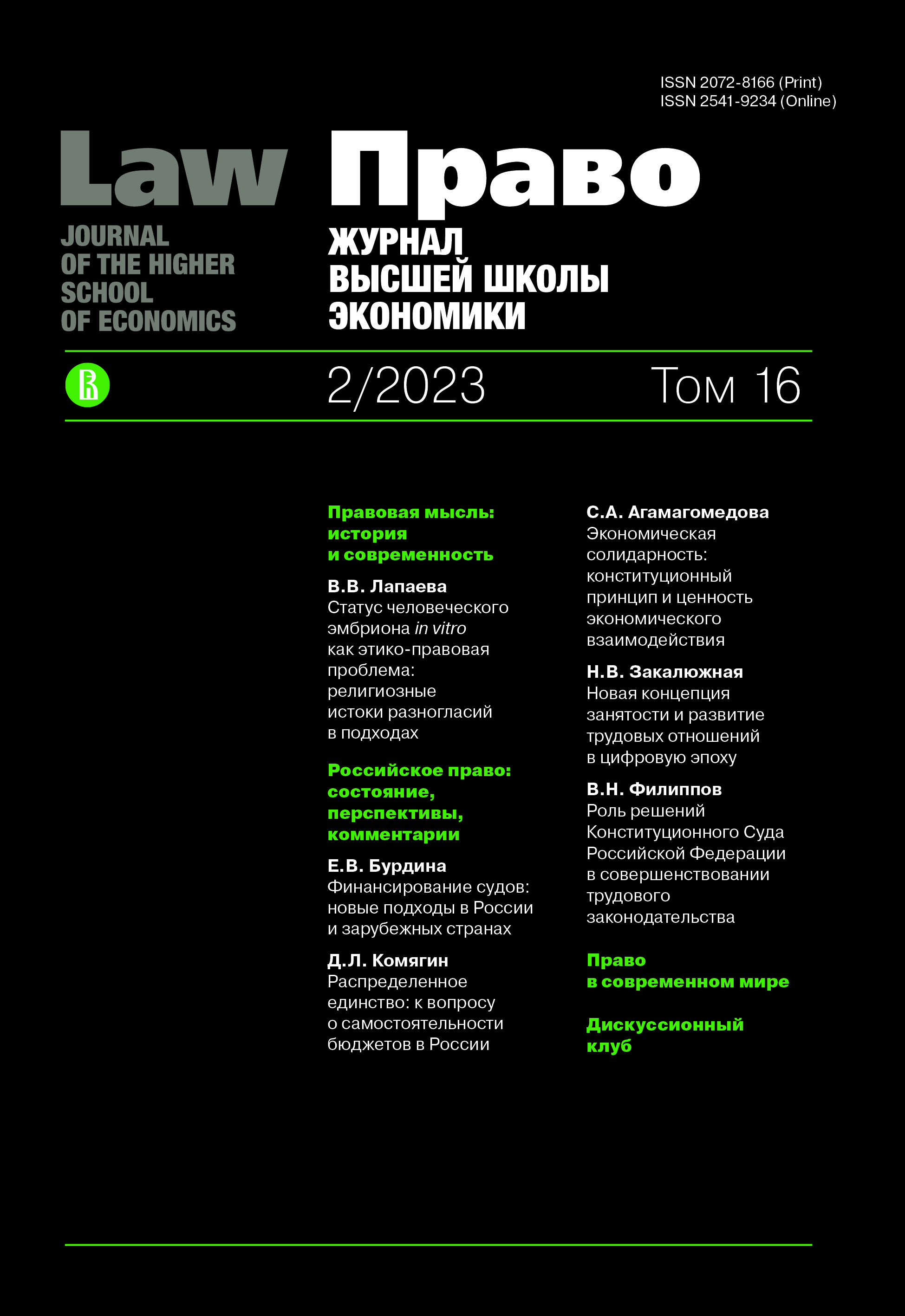Court Funding: New Approaches in Russia and Foreign Countries
Abstract
The growing workload on the courts both in Russia and in foreign countries actualizes the issue of allocating sufficient financial resources to the courts to deal with the growing volume of cases. There is a growing need for an adequate budget for the workload of the courts, considered not only as a financial instrument, but also as a guarantee of the independence of courts and judges. The subject of the work was the problem of court financing, which provides sufficient resources for the administration of justice in full, the definition of a court budgeting model corresponding to the modern period. The author comes to the conclusion that the procedure for financing the courts, fixed by law, as not related to the workload and results of the activities of the courts, cannot be considered a tool for the further development of the Russian judicial system. The transition to a different technology for the formation of the budget of the courts is substantiated, focusing on the efficiency and results of their work. The purpose of the article is to develop theoretical provisions on the financing of courts, including the sufficiency criteria and features of planning the budget of the judiciary, using the proven experience of financing courts in foreign countries, as well as formulating, on this basis, proposals for improving the current Russian legislation. The article analyzes the varieties of the resultoriented budgeting model operating in the Netherlands, Finland and France, which differ in the degree of obligation for the formation of the budget of information on the results of the work of the courts. It was revealed that the basis for planning the budget of courts is information about their workload, calculated according to the methodology for calculating the weighted average complexity of cases. The limitation of the application of traditional ideas about productivity and efficiency as economic categories to judicial activity, the quality of which cannot be described by simple quantitative indicators of cases considered, is argued. The values of justice set the objective limits of productivity, and the norms of the workload of judges and court staff, fixed by law, will make it possible to correct the excessive workload of the courts and determine the necessary resources for proper justice, including staff units and financial allocations.References
Bartsits A.D. (2021) Organization of budget financing of the national judicial system and the adoption of a set of measures to improve it in 2021-2023. Ekonomika. Nalogi. Pravo=Economics. Taxes. Law, vol. 14, no. 1, pp. 131-141 (in Russ.)
Expert-Foulquier C. (2020) The financial independence of the judiciary in France. International Journal for Court Administration, vol. 11, no. 1, pp. 1-16. DOI: https://doi.org/10.36745/ijca.300
Hertzog R. (2006) La loi organique relative aux lois de finances (LOLF) dans l'histoire des grands textes budgétaires: continuité et innovation. Revue française d' administration publique, no. 1, pp. 15-30. DOI: https://doi.org/10.3917/rfap.117.0015
Ho A. (2018) From performance budgeting to performance budget management: theory and practice. Public Administration Review, vol. 78, no. 5, pp.748-758. DOI: https://doi.org/10.1111/puar.12915
Holvast N., Doornbos N. (2015) Exit, voice, and loyalty within the Judiciary: judges' responses to new managerialism in the Netherlands. Utrecht Law Review, vol. 11, no. 2, pp.49-63. DOI: https://doi.org/10.18352/ulr.317
Kleiman M., Schauffler R. et al. (2019). Weighted caseload: a critical element of modern court administration. International Journal of the Legal Profession, vol.26, no. 1, pp. 21-32. DOI: https://doi.org/10.1080/09695958.2018.1490293
Langbroek P. (2019) Financing the Judiciary in the Netherlands: between work overload in the courts and government control of the Judicial Budget. International Journal for Court Administration, vol. 10, no. 1, pp. 1-2. DOI: https://doi.org/10.18352/ijca.292
Lienhard A., Kettiger D. (2010) Caseload management in the law courts: methodology, experiences and results of the first Swiss study of administrative and social insurance courts. International Journal For Court Administration, vol. 3, no. 1, pp. 30-49. DOI: https://doi.org/10.18352/ijca.52
Lienhard A., Kettiger D. et al. (2015) Combining weighted caseload study with an organizational analysis in courts: first experiences with a new methodological approach in Switzerland. International Journal For Court Administration, vol. 7, no. 1, pp. 27-36.
Lu E., Mohr Z., Ho A. (2015) Taking stock: assessing and improving performance budgeting theory and practice. Public Performance and Management Review, vol. 38, no. 3, pp. 426-458. DOI: https://doi.org/10.1080/15309576.2015.1006470
Viapiana F. (2019) Funding the judiciary: how budgeting system shapes justice. A comparative analysis of three case studies. International Journal for Court Administration, vol. 10, no. 1, pp. 23-33. DOI: https://doi.org/10.18352/ijca.295
Visser M., Schouteten R., Dikkers J. (2019) Controlling the courts: new public management and the Dutch judiciary. Justice System Journal, vol. 40, no. 1, pp. 39-53. DOI: https://doi.org/10.1080/0098261X.2018.1539645
Webber D. (2007) Good budgeting, better justice: modern budget practices for the judicial sector. World Bank Law and Development Working Papers. Washington: World Bank, 68 p.
Winkler D., Lienhard A. et al. (2015) Combining a weighted caseload study with an organizational analysis in courts: first experiences with a new methodological approach in Switzerland. International Journal for Court Administration, vol. 7, no. 1, pp. 27-36. DOI: https://doi.org/10.18352/ijca.174
Zlomanova E.A., Petrushina E. P. (2022) Performance of budgeting approaches. Biznes-obrazovanie v ekonomike znaniy=Business Education in the Knowledge Economy, no. 2, pp. 31-34 (in Russ.)
Copyright (c) 2023 Law Journal of the Higher School of Economics

This work is licensed under a Creative Commons Attribution-ShareAlike 4.0 International License.





